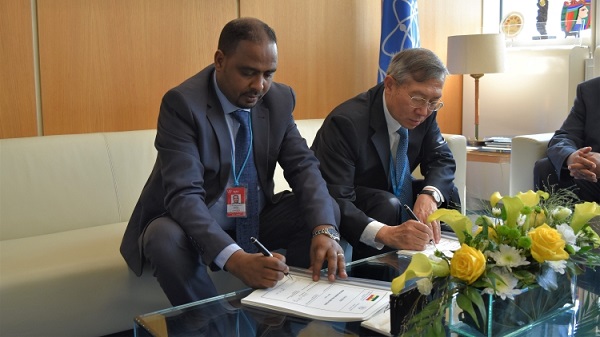
Based on the Country Programme Framework, IAEA will provide technical assistance and financial support to Ethiopia by identifying priority areas where the transfer of nuclear technology and technical cooperation resources will be directed to support national development goals
VIENNA, Austria (Semonegna)–A Country Program Framework (CPF) has been signed between Ethiopia’s Ministry of Science & Technology (MoST) and the Vienna-headquartered International Atomic Energy Agency (IAEA) for financial support and technical assistance of five projects for the next five years.
The projects are crafted from the sectors including agriculture, health, industry, water resources management and radiation protection & safety.
Ethiopia’s Country Programme Framework for the period of 2018–2023 was signed by Dr. Shumete Gizaw Woldeamanuel, State Minister, MoST, and Dazhu Yang, IAEA Deputy Director General and Head of the Department of Technical Cooperation on 20 September 2018.
A CPF is the frame of reference for the medium-term planning of technical cooperation between a Member State and the IAEA and identifies priority areas where the transfer of nuclear technology and technical cooperation resources will be directed to support national development goals.
Ethiopia has been an IAEA Member State since 1957. Its 2018–2023 CPF identifies seven priority areas:
- Nuclear radiation safety and security
- Food and agriculture
- Health and nutrition
- Water resource management
- Energy planning
- Industrial applications
- Human resources capacity building
About the International Atomic Energy Agency (IAEA)
The International Atomic Energy Agency is the world’s central intergovernmental forum for scientific and technical co-operation in the nuclear field. Founded in 1957, it works for the safe, secure and peaceful uses of nuclear science and technology, contributing to international peace and security and the United Nations’ Sustainable Development Goals.
The IAEA has 170 member states. Most UN members and the Holy See are Member States of the IAEA. Non-member states Cape Verde (2007), Tonga (2011), Comoros (2014), Gambia (2016) and Saint Lucia (2016) have been approved for membership and will become a Member State if they deposit the necessary legal instruments
